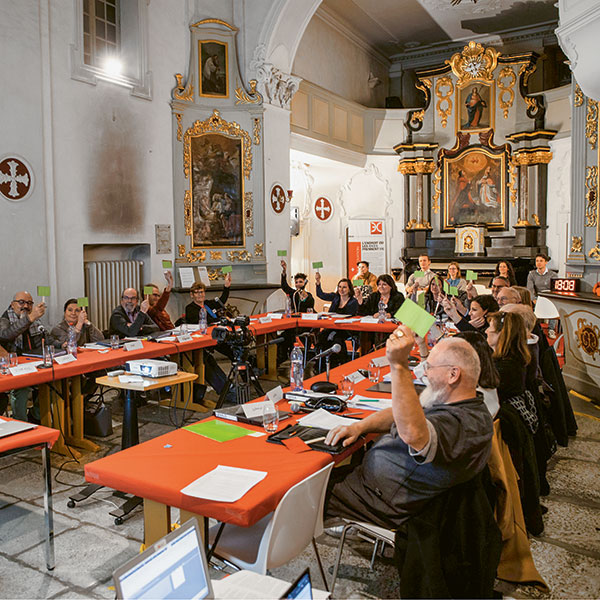ANTI-SEMITISM
The difficult debate about anti-Semitism
Is it anti-Semitic to call Israel an ‘apartheid state’? This is now a question that’s dividing academia. With the help of three scholars, we take a look at a concept and two definitions of it.

Volker Beck, President of the German-Israeli Society (centre) takes part in a demonstration in Berlin on 10 March 2024. The banner names three different forms of anti-Semitism – a three-pronged approach that is proving controversial. | Photo: Christophe Soeder/Keystone
The war in the Gaza Strip has triggered vehement reactions across the world, including student occupations of university buildings and demonstrations for a boycott against Israel. In such instances, accusations of anti-Semitism are brought quickly, without any justification. And this is a problem, according to researchers writing on the online platform ‘Geschichte der Gegenwart’ (‘history of the present’). “If we are going to combat anti-Semitism, it’s not enough to accuse others of it in a vague manner”, writes the German cultural scientist Aleida Assmann, whose article offers clarification and puts anti-Semitism into three different categories: far-right domestic anti-Semitism, Arab/Muslim anti-Semitism, and politically left-wing anti-Semitism.
Assmann defines the domestic far-right variant as the one that has haunted Europe for 2,000 years and that has been transformed from its originally Christian motivations into nationalistic, racist conspiracy fantasies. This is the anti-Semitism that culminated in the Holocaust that is now relativised or denied by its latter-day proponents. Assmann sees the Arab/Muslim variant as a political reaction to the founding of Israel and the expulsion of Palestinians from its territory from 1948 onwards.
This hatred is not directed against Jews across the whole world, but against their presence in the Middle East. “It’s actually Arab anti-Israelism”, she said in a telephone conversation with Horizons. Muslim fundamentalism was later added on top of existing anti-Israel feeling. Left-wing anti-Semitism, on the other hand, is politically and ideologically motivated and is a legacy of the Cold War and of the German Democratic Republic (East Germany), whose ruling communists saw the state of Israel as a capitalist occupying power. The militant left also fundamentally rejects nationalism. “So this is really anti-Zionism”, says Assmann, to be more precise.
This distinction is important, she says, even if it isn’t always possible to differentiate clearly between these various forms. Left-wing circles, for example, also use right-wing extremist conspiracy fantasies in which Jews are imagined as the supposed masterminds of high finance. And there are Muslims who deny the Holocaust or even glorify it while calling for the destruction of Israel. “Extreme right-wing anti-Semitism has metastasised globally”, says Assmann. This is precisely why Alfred Bodenheimer, the head of the Department of Jewish Studies at the University of Basel, is unsure whether this tripartite division is really helpful. “These forms are extremely intertwined”, he says.
Politicising anti-Semitism triggers more debate
Historical precision is also important to Bodenheimer. Muslim anti-Semitism didn’t just come into existence when the state of Israel was founded in 1948. Back in the 1930s, the National Socialists in Germany did everything they could to find allies in the Muslim world – such as by cooperating with the Grand Mufti of Jerusalem. “The traces of that have been more long-lasting in the Near East than in Germany, where people tried to come to terms with the past after the Second World War”, he says. As for left-wing anti-Semitism, Bodenheimer emphasises the significance of the post-colonial approach to the current hatred of Israel: “History is here being manipulated so as to condemn Israel as a colonial power”. In this instance, Jews are compared with the Europeans who occupied other countries, conveniently ignoring the fact that the Jews also originated in the region where Israel exists today.
Christina Späti is a Swiss historian at the University of Fribourg. She feels that Assmann’s tripartite division fails to acknowledge “the anti-Semitism that comes from the middle of society”. Reducing it to just three groups is too restrictive, she says: “Hostility towards Jews constitutes an alleged knowledge system that has existed for centuries”. It is based, she says, on negative prejudices and stereotypes. “Conspiracy fantasists then weave these into explanatory patterns”, she says, insisting that “there is no such thing as specifically left-wing anti-Semitism or Muslim anti-Semitism. There are just different actors who emphasise different aspects”. As we can see, our researchers disagree in all kinds of ways.
These divergences are also reflected in the two current, widely accepted definitions of anti-Semitism, one by the International Holocaust Remembrance Alliance (IHRA) from the year 2016, which has been accepted by over 30 countries including Switzerland, and the Jerusalem Declaration of Antisemitism from 2021, which has gathered 360 signatories from academia, including Assmann. In contrast to the latter, the IHRA’s definition is not founded in the academy, but was developed in order to be able to pursue concrete instances of anti-Semitism, says Späti, who adds that it obviously functions well for purposes of monitoring. “The debates started with the increasing politicisation of the definition”. In other words, when people began defining ‘opposition to Israel’ as anti-Semitic in and of itself. The biggest gap between the two definitions lies precisely in the question as to when criticism of the state of Israel may be deemed anti-Semitic.
Two definitions, different consequences
The core of the IHRA definition is this: “Antisemitism is a certain perception of Jews, which may be expressed as hatred toward Jews. Rhetorical and physical manifestations of antisemitism are directed toward Jewish or non-Jewish individuals and/or their property, toward Jewish community institutions and religious facilities”. The German government has expanded on this as follows: “Above and beyond this, the state of Israel may also be the target of such attacks”. From this perspective, a call for a boycott of Israel can also be considered anti-Semitic.
The IHRA also lists eleven “contemporary examples of antisemitism in public life”, such as: “Denying the Jewish people their right to self-determination, e.g., by claiming that the existence of a State of Israel is a racist endeavor”. So if people at demonstrations chant that Israel is an apartheid state, this statement may be considered anti-Semitic. A further example is this: “Applying double standards by requiring of [Israel] a behavio[u]r not expected or demanded of any other democratic nation”. So if one were to urge Israel not to respond to terrorism with violence, then this, too, may similarly be deemed anti-Semitic.
The core of the Jerusalem Declaration, in contrast, is this: “Antisemitism is discrimination, prejudice, hostility or violence against Jews as Jews (or Jewish institutions as Jewish)”. This corollary “as Jewish” is important, because it means that a call for a boycott of Israel would not be considered anti-Semitic per se. The Jerusalem Declaration also lists 15 examples, including five that “on the face of it, are not antisemitic”. These include: “Criticizing or opposing Zionism as a form of nationalism … It is not antisemitic to support arrangements that accord full equality to all inhabitants ‘between the river and the sea’”.
This also applies to “[e]vidence-based criticism of Israel as a state … also includ[ing] its policies and practices, domestic and abroad, such as the conduct of Israel in the West Bank and Gaza … It is not antisemitic to point out systematic racial discrimination”, nor “to compare Israel with other historical cases, including settler-colonialism or apartheid”. According to this Declaration, the same norms of discussion should apply to Israel and Palestine as also to all other States. So a banner at a demonstration calling Israel an ‘apartheid state’ would in this sense not be anti-Semitic. Nor would the slogan ‘From the river to the sea’.
The fear of a tipping moment
But in practice, as Bodenheimer emphasises, things rapidly become complicated. One would have to ignore the reality on the ground, he says, “if anyone today pretended that the phrase ‘From the river to the sea, Palestine will be free’ is a friendly appeal for Palestinians and Jews to come together that’s covered by the Jerusalem Declaration”. He adds that “the use of this call in Europe and the USA immediately after the Hamas massacre has given that vision an unmistakable, genocidal slant”.
Which of the two definitions you use is a political decision, says Späti. Those who tend to be critical of Israel are more likely to follow the Jerusalem Declaration, while others prefer that of the IHRA. But it’s not the definitions that really worry Bodenheimer: “I’m afraid that the term itself will be upended so that people feel they can once again say: ‘I’m anti-Semitic’”. He’s already read similar statements from certain commentators, sometimes justifying themselves along the lines of: “When I see what the Jews are doing, they’re obviously the real evil in the world”. In this manner, the discourse on anti-Semitism can suddenly become a discourse on one opinion among many. “Until now, we’ve been protected by a taboo on hating Jews. But this is a very fragile consensus”. It’s a consensus that also seems to be crumbling.
Bodenheimer suggests conducting a thought experiment: “We should place the term ‘anti-Semitic’ under a two-year moratorium because it covers up more than it reveals”. Conceivable alternatives, he says, might include adjectives such as ‘inhuman’, ‘generalising’, ‘Holocaust-denying’ or simply ‘unfair’. “Then you’d really have to think about what you actually want to say, and honestly state your accusations. And then people would surely start to talk to each other more again”.




